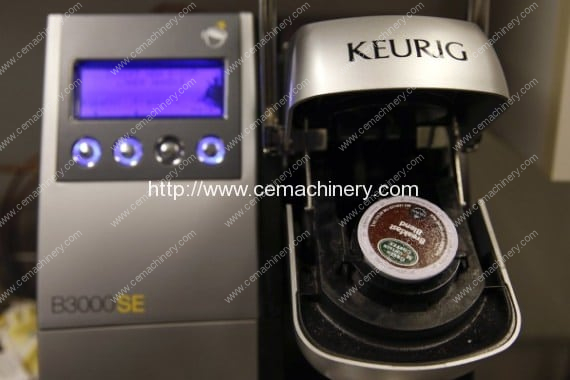The Keurig revolution: When coffee-by-the-cup makes sense and when it doesn’t
A single-serve Keurig Green Mountain brewing machine is seen before dispensing coffee in New York in this file photo from February 6, 2015.
Keurig coffeemakers have grown in popularity over the last few years. The ability to make a single cup of a particular flavor of coffee on demand has been a huge selling point for these appliances. As awesome as that sounds, the convenience of the Keurig comes with a price.
Keurig-brewed coffee is more expensive than traditional methods
Keurig coffeemakers cost more money to purchase upfront and to operate over their life. Initially, a Keurig 2.0 K350 brewer retails for $149.99 while a typical brew coffeemaker can be purchased for less than twenty dollars.
Making matters worse, Keurig machines are also more expensive when it comes to brewing coffee. If you buy a 60 K-Cup variety pack with a twenty percent off coupon at Bed Bath & Beyond, a single K-Cup will cost you $0.53. Compare that to the cost of a regular cup of coffee from your typical coffeemaker at approximately $0.08 per twelve-ounce cup, using Maxwell House ground coffee. Other brands of coffee will cost more, but should still be cheaper than the individual K-Cup price.
When using a regular coffee maker, you must remember to purchase a pack of coffee filters occasionally. While these are inexpensive, they do add to the cost per cup of coffee over the long run.
If you want to drink the cheapest overall coffee, you should opt for instant coffee, since there is no cost required to buy a coffeemaker. Simply add some instant coffee to hot water and you can have a twelve-ounce cup of coffee for as little as $0.07 per cup. For a little more outlay, ground beans can be put into a paper filter in a pour-over filter cone, and hot water poured over them for inexpensive fresh coffee.
Keurig still cheaper than Starbucks
While Keurig-brewed coffee costs more than traditionally brewed coffee, consumers still save a significant amount of money over the long run by using a Keurig brewer rather than buying a daily drink at Starbucks. You would save roughly $1.25 a day or $456 a year assuming you would forgo a daily $1.75 twelve-ounce cup of coffee from Starbucks and instead make a ten-ounce cup of coffee from your Keurig. After subtracting out the cost of the Keurig machine, you will still end up with hundreds of extra dollars in your pocket at the end of the first year.
If you instead opt for the cheaper McDonald’s twelve-ounce coffee, which costs just one dollar per cup, you will end up paying approximately $183 more per year than you would if you used a Keurig coffeemaker. While buying a Keurig coffeemaker would wipe out most of these savings during the first year, each additional year you continue to use the machine the savings would be yours to pocket.
Keurig for the office
While a Keurig coffeemaker may not be the most cost effective method to make coffee, they are a big hit with employees at the workplace. The K-Cup system allows employees to make their coffee of choice without making a big mess in the break room.
Employers no longer have to worry about an employee leaving the coffee pot on overnight to return to a pot of extremely burnt coffee the next morning. Other concerns that disappear include someone making coffee weaker or stronger than you personally prefer or Bob from Accounting always taking the last cup of coffee and not making more. Instead, employees simply make their own preferred cup of coffee and dispose of used K-Cups in a trash can. While this may raise coffee costs in the office, the reduced headache may be worth the additional cost.
Keurig limits their 2.0 coffeemaker
When Keurig launched the latest 2.0 version of their coffeemaker, they added an additional feature that made many fans angry. The company designed their new coffeemaker only to accept licensed K-Cups that carry a special ink. Without the ink, third party K-Cups could not be used in the new coffeemaker, forcing consumers to buy the more expensive licensed K-Cups.
Lucky for consumers and unfortunately for Keurig, you can work around the new ink-detecting system. The simplest solution is to simply take a licensed K-Cup, remove the portion of the label with the special ink, and tape it over the sensor.
Whenever you brew a cup of coffee, the sensor will see the special ink, no matter which K-Cup you insert into the machine. This hack allows consumers to save money by buying third party K-Cups or by using refillable and reusable K-Cups.
Keurig caves and brings back the My K-Cup
The My K-Cup, a reusable cup that consumers could fill with their choice of coffee, was initially incompatible with the newly launched 2.0 version of their coffeemaker. After much outcry, Keurig caved to pressure and brought back the My K-Cup, which can greatly reduce the cost per cup of coffee when using a Keurig 2.0 machine.
Buying a Keurig saves you money if you normally opt for coffee at McDonald’s or Starbucks on a daily basis. However, if you normally brew your coffee at home or opt for instant coffee, a Keurig will increase your yearly coffee bill. With this knowledge, buying a Keurig should be an easy decision based on your current drinking habit.
Read More: Keurig 2.0 coffee caspule lid


